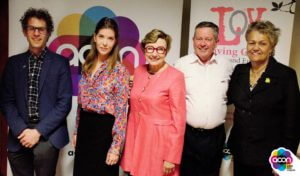September is Dementia Awareness Month, a time to understand a disease that impacts over 413,000 Australians and is projected to reach over 536,000 people by 2025.
While the disease and these statistics can be frightening and worrisome, there are some really important things to consider to make your family’s journey with dementia a lot easier.
As with all relationships, communication is key. But you must be aware that your usual communication methods will need adapting – a shift – when you’re dealing with a loved one who has dementia.
Last week we gained some valuable insights when we heard Steven Sabat, Professor Emeritus, speak at the Dementia Awareness Month presentation at the Art Gallery of NSW. He discussed the cognitive and social abilities of people with moderate to severe dementia – and how communication between people diagnosed with dementia and their caregivers may be enhanced.
Here are some strategies we recommend to alleviate stress and to strengthen your relationship with your loved one, through this new challenge. (And inspired by the powerful words of the great Johnny Mercer and the Pied Pipers).
Accentuate the positives
We know actions speak louder than words and this is particularly the case when speaking with people with dementia. Have open, friendly body language – give a reassuring hold of the hand. Often dementia patients can be confused and anxious, but your warmth will help keep them at ease.
If they’ve got information wrong, or have recalled something that didn’t occur – don’t concern yourself with correcting them as this will create more confusion. Play along or change the subject. And if you start to feel a bit frazzled or stressed, take a deep breath, keep calm and carry on.
Eliminate the negatives
TV, radio, or a bustling environment can be incredibly distracting and may make it difficult for you to hold each other’s attention. Be sure to turn background noise off, close a curtain or move to a quiet space so you can focus on one another.
Routine is also very important. Due to the confusing nature of dementia, it’s crucial to maintain a level of regularity in the day to day activities and life of a person with dementia. New environments can be very confusing and even frightening, so try to be aware of this risk factor.
If your loved one appears in distress, don’t ignore this, but do try to move on and find something else to think about. For example you can say “I’m sorry you’re feeling upset – let’s go for a walk in the garden.”
Latch on to the affirmative
If you find an activity that your loved one particularly enjoys, hold onto this, as chances are it will keep working.
Often the best method is highlighting the person’s interests and doing activities based around this. Did they love music? Listen to music! Art galleries? Movies? Visual and audio activities, especially those that bring a sense of nostalgia for the patient can be very comforting.
You may also find going through old photo albums, or talking about stories from their youth can be a helpful topic to get onto – and one where their memories are still vivid. Try to steer clear of asking questions that rely on short-term memory.
Don’t mess with Mr In-Between
Treat all people with common courtesy, have clarity in your communication and don’t put people in a position to fail. Be very direct and don’t ask roundabout questions, otherwise you’ll find yourself on a roundabout that you can’t get off!
By this we mean, try to avoid open-ended questions, or giving too many choices. For example, “Would you like to wear pants or a skirt today?” gives two very clear options. If there is confusion, rephrase your questions and maintain a non-anxious presence.
Try to use people’s names rather than using pronouns like him, her, they – remembering your loved one may have lost track of very recent conversations and being specific will help keep them on course.
With activities, break these down into steps rather than jumping straight into them and remember that visual cues can be very helpful.
Finally, try to maintain a sense of humour – as long as it’s not at your loved one’s expense. Despite their new mindset, they still have their social skills and will love a laugh – so look for the humour and positivity in each moment, and it will be a better experience for all.
With over 60% of clients with dementia, we understand the challenges but also know there is still so much space for creating special moments and enjoying time with your loved one – it just takes a little bit of patience and practice.
If you, or a loved one is experiencing dementia, Fight Dementia has wonderful resources, fact sheets and suggestions to support you on this unique journey.
https://www.fightdementia.org.au/

